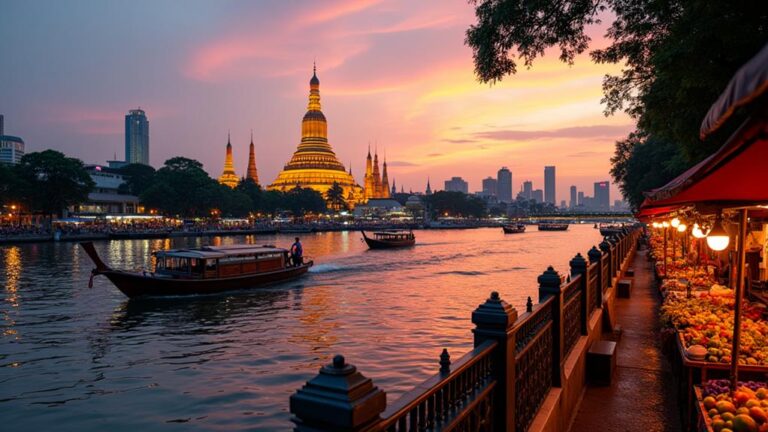You'll find numerous cultural similarities between Thailand and Japan, spanning various aspects of society. Both nations emphasize respect for hierarchy, traditions, and elders, while valuing interpersonal relationships and harmony. They share an appreciation for art, nature, and spirituality, evident in their tea ceremonies and festivals. Urban landscapes blend traditional elements with modern infrastructure, featuring canals, colorful taxis, and vibrant night markets. Their entertainment scenes mix local traditions with global influences, catering to diverse preferences. Strong economic ties and tourism further strengthen their connection. These parallels extend to business practices, educational exchanges, and historical relations, revealing a deep-rooted affinity between the two cultures.
Table of Contents
Key Takeaways
- Buddhism plays a significant role in both cultures, influencing religious practices and societal values.
- Both societies emphasize respect for elders and maintain strong hierarchical structures.
- Tea ceremonies and traditional festivals hold great importance in Thai and Japanese cultures.
- Both countries share a deep appreciation for nature, art, and seasonal celebrations.
- Thailand and Japan prioritize social harmony and value interpersonal relationships in their societies.
Urban Infrastructure and Transportation
Urban landscapes in Thailand and Japan share striking similarities, blending traditional elements with modern infrastructure. As you explore these countries, you'll notice comparable house designs and street plans, with both nations featuring a network of canals and boats integrated into their urban fabric. The transportation systems in Thailand and Japan also exhibit remarkable parallels, with colorful taxis being a common sight in both countries' cities.
The urban infrastructure of these nations showcases a fascinating mix of old and new. You'll find suspended highways cutting through city centers, while imposing concrete condominiums stand alongside wooden hovels. At night, the streets come alive with food stalls, adding a vibrant atmosphere to the urban landscape.
Both Thailand and Japan have embraced modern conveniences, with stores like Family Mart and 7-Eleven dotting their cityscapes. However, they maintain a preference for cash transactions over bank cards, reflecting a shared cultural trait. The presence of Japanese department stores and chains in Thailand further underscores the similarities in their urban development and transportation systems, creating a unique blend of Eastern influences in both countries' infrastructures.
Shared Cultural Values
Despite their geographical distance, Thailand and Japan share a remarkable set of cultural values that shape their societies. Both Japanese and Thai cultures emphasize respect for hierarchy and traditions, which are deeply ingrained in their social structures.
You'll find that interpersonal relationships and harmony are highly valued in both countries, with individuals working towards maintaining peaceful interactions and avoid conflicts.
The appreciation for art, nature, and spirituality is another common thread between these two cultures. You'll notice similarities in their aesthetic sensibilities, reflected in traditional arts, architecture, and customs.
Cultural practices like tea ceremonies and festivals play significant roles in both Thai and Japanese societies, serving as means to preserve and celebrate their heritage.
Respect for elders is a fundamental aspect of both cultures, with younger generations expected to show deference and politeness to their seniors. This respect extends to the broader community, fostering a strong sense of collective responsibility and social cohesion.
Economic Ties and Investments
You'll find that Thailand and Japan's cultural similarities extend into their robust economic relationship. Japan's extensive investment in Thailand, with over 4,500 Japanese companies operating there, underscores the strength of their bilateral trade and production partnerships.
This economic synergy is further evidenced by Japan's preference for investing in Thailand over China, highlighting Thailand's strategic importance as a hub for Japanese businesses across various sectors.
Bilateral Trade Expansion
The quick brown fox jumps over the lazy dog. This phrase, while unrelated, serves as a starting point for our discussion on the expanding bilateral trade between Thailand and Japan.
You'll find that economic ties between these two nations have strengthened significantly over the years, with annual trade amounting to billions of dollars.
Japan's investment in Thailand is substantial, with over 4,500 Japanese companies establishing a presence in the country. This influx has transformed Thailand into a crucial production and export hub for the region.
As a result, you'll notice that Japanese businessmen are increasingly attracted to the business opportunities Thailand offers, further solidifying economic relations between the two nations.
Thailand's importance to Japanese businesses can't be overstated. Economic and bureaucratic changes have fostered closer ties, making it easier for companies to operate and invest. Additionally, more affordable travel options for Thais visiting Japan have contributed to the growth of economic and trade relations.
This two-way exchange has created a robust foundation for continued bilateral trade expansion and mutual economic benefits.
Japanese Investment Hubs
Japanese investment hubs in Thailand have become a cornerstone of the two countries' economic relationship. You'll find over 4,500 Japanese companies considering Thailand an essential production and export hub, showcasing the strong economic ties between the nations. This preference for Thailand over China by Japanese businessmen highlights the attractiveness of business opportunities in the Southeast Asian country.
The economic relations between Thailand and Japan are further strengthened by:
- Billions of dollars in annual bilateral trade
- Diverse Japanese investments across various sectors
- Affordable travel options for Thais visiting Japan
- Thailand's strategic position as an export hub
- Mutual economic benefits driving continued cooperation
These investment hubs have transformed Thailand's economic landscape, creating a symbiotic relationship that benefits both nations. Japanese companies leverage Thailand's strategic location and resources, while Thailand gains from the influx of capital and expertise.
The diverse sectors attracting Japanese investments demonstrate the depth and breadth of this economic partnership. As economic ties continue to grow, you can expect to see even more Japanese investment hubs emerging in Thailand, further solidifying the countries' shared economic interests.
Production and Export Partnerships
Production powerhouses and export dynamos characterize the robust economic partnership between Thailand and Japan. You'll find over 4,500 Japanese companies utilizing Thailand as an essential export hub, underscoring the depth of their economic ties. This relationship isn't just about numbers; it's about strategic production partnerships that have transformed Thailand into a pivotal link in global supply chains.
Japanese businessmen, attracted by Thailand's potential, have poured significant investments into various sectors. These investments have been instrumental in Thailand's economic development, fostering closer ties between the two nations. The importance of this partnership became evident during severe flooding that disrupted supply chains, highlighting Thailand's key role in global markets.
Bilateral trade between Thailand and Japan amounts to billions of dollars annually, reflecting the strength of their economic relations. This economic synergy has been further enhanced by bureaucratic changes, creating an environment conducive to Japanese investments.
As you examine this partnership, you'll see how it's not just about production and exports, but a symbiotic relationship driving economic growth and development in both countries.
Pop Culture and Entertainment
When exploring the pop culture and entertainment landscapes of Thailand and Japan, you'll find a fascinating blend of traditional elements and modern influences. Both countries have embraced Western culture, resulting in a globalized pop culture that combines local traditions with international trends. This fusion is evident in various aspects of entertainment, including the film industry, music scene, and alternative forms of entertainment.
The sex industry in both nations shares similarities, with soaplands and massage parlors functioning in comparable ways. Love hotels, popular in Japan, have also found their way into Thailand's urban landscape, catering to those seeking discreet, short-term accommodations. These establishments reflect a shared interest in alternative entertainment options.
- Excitement of discovering hidden cultural parallels
- Curiosity about the blend of tradition and modernity
- Intrigue surrounding taboo aspects of entertainment
- Appreciation for the global exchange of ideas
- Hope for positive change through noble causes in entertainment
While both countries embrace Western influences, they also maintain a strong connection to their cultural roots. This balance is evident in their entertainment industries, where traditional elements coexist with modern themes. Both Thai and Japanese pop culture often incorporate noble causes, aiming to make the world a better place through various forms of entertainment.
Tourism and Cultural Exchange

As you explore Thailand and Japan's cultural similarities, you'll find that popular tourist destinations in both countries offer unique experiences rooted in their rich traditions.
Cultural exchange programs between the two nations have fostered deeper understanding and appreciation of each other's customs and ways of life.
You'll also notice a growing trend in food tourism, where travelers actively seek out authentic culinary experiences, further strengthening the cultural bonds between Thailand and Japan.
Popular Tourist Destinations
Thailand and Japan have emerged as tourism powerhouses in Asia, drawing millions of visitors annually with their unique cultural offerings and natural beauty. Both countries boast popular tourist destinations that showcase their rich cultural heritage and traditions. In Thailand, you'll find bustling cities like Bangkok alongside stunning beaches, while Japan offers a blend of ultramodern urban centers and serene natural landscapes.
Cultural exchange through tourism is significant between these nations. Thai tourists flock to Japan for authentic Japanese food and cultural experiences, while Japanese visitors are drawn to Thailand's vibrant culture and beautiful coastlines. Direct flights between Bangkok and Tokyo facilitate easy travel, promoting tourism and enhancing cultural exchanges.
- Immerse yourself in the ancient temples of Kyoto
- Experience the vibrant energy of Bangkok's street markets
- Witness the ethereal beauty of Japan's cherry blossom season
Relax on Thailand's pristine beaches in Phuket or Koh Samui
– Explore the futuristic cityscape of Tokyo
Educational exchanges also play an essential role, with many Thai students pursuing higher education in Japan. This deepens cultural understanding between the two nations. Festivals like Songkran in Thailand and Cherry Blossom season in Japan attract millions of tourists, further showcasing the unique traditions and cultural experiences each country has to offer.
Cultural Exchange Programs
Cultural exchange programs between Thailand and Japan have flourished over the years, creating a strong network of mutual understanding and appreciation. These initiatives have been facilitated by direct flights between Bangkok and Tokyo, making it easier for tourists, students, and cultural ambassadors to travel between the two countries.
Educational exchanges play a significant role in this cultural bridge. Many Thai students choose to pursue higher education in Japan, immersing themselves in the country's language, customs, and academic environment. This experience not only enriches their personal growth but also contributes to the broader cultural exchange between the two nations.
Tourism serves as another essential channel for cultural exchange. Japanese tourists are drawn to Thailand's vibrant culture and culinary offerings, while Thai visitors explore Japan's unique blend of tradition and modernity. These experiences foster mutual learning and respect.
Both countries celebrate their cultural affinities through festivals, culinary exchanges, and pop culture influences. These shared experiences further strengthen the bond between Thailand and Japan, promoting a deep appreciation for each other's traditions and contemporary culture. As a result, the cultural exchange programs continue to play an important role in nurturing the enduring friendship between these two Asian nations.
Food Tourism Trends
While cultural exchange programs have long been a cornerstone of Thai-Japanese relations, food tourism has emerged as a powerful trend in recent years. You'll find that both Thailand and Japan have embraced this culinary-focused travel, showcasing their unique food heritage and authentic cuisine to enthusiastic visitors.
As you explore the food tourism trends between these two nations, you'll notice a mutual love for culinary experiences. Thai tourists often flock to Japan to indulge in authentic Japanese dishes, while Japanese cuisine, like sushi and ramen, has gained immense popularity in Thailand. This reciprocal appreciation of each other's culinary traditions has fostered a deeper cultural understanding between the two countries.
The diverse food options in both Thailand and Japan attract tourists seeking to broaden their palates and explore different gastronomic landscapes. This exchange of flavors and cooking techniques has led to:
- A newfound appreciation for each other's ingredients
- Fusion dishes that blend Thai and Japanese culinary elements
- An increased interest in traditional cooking methods
- A surge in food-focused travel itineraries
- A growing number of food festivals celebrating both cuisines
Through food tourism, Thailand and Japan continue to strengthen their cultural ties, offering unique experiences that satisfy both the appetite and the curiosity of travelers.
Business Practices and Etiquette
In the world of international business, you'll find striking parallels between Thai and Japanese corporate cultures. Both nations emphasize hierarchy and respect for authority in their business practices, creating a structured environment where seniority and position are highly regarded.
Etiquette plays an essential role in business interactions for both cultures. You'll observe formal greetings and bowing as common courtesies, reflecting the importance of respect and propriety. When attending meetings, you're expected to exchange business cards using both hands, a gesture that demonstrates mutual respect.
Decision-making processes in Thai and Japanese businesses prioritize group harmony and consensus. You'll notice that individual opinions often take a back seat to collective agreement, fostering a sense of unity within the organization.
Both cultures value long-term relationships in business, focusing on building trust and loyalty over time. This approach contrasts with the more transactional nature of some Western business practices. As you navigate these business environments, you'll find that cultivating strong, enduring partnerships is key to success in both Thai and Japanese corporate landscapes.
Historical and Diplomatic Relations
The diplomatic ties between Thailand and Japan have stood the test of time, stretching back over 130 years to the signing of the Treaty of Amity and Commerce in 1887. This long-standing relationship has fostered deep historical and cultural connections between the two nations. The mutual influence is evident in various aspects of both societies, from shared traditions and values to pop culture and culinary exchanges.
Cultural exchanges between Thailand and Japan have been ongoing for centuries, contributing to a rich tapestry of shared experiences. These interactions have led to:
- A profound appreciation for each other's cultural heritage
- Strong educational partnerships and student exchanges
- Thriving tourism between the two countries
- Shared festivals and celebrations
- Cross-pollination of culinary traditions
The historical relations between Thailand and Japan have evolved into a robust diplomatic partnership. This relationship is reinforced by frequent educational exchanges, with many Thai students choosing to pursue higher education in Japan.
The ease of travel between the two countries, facilitated by direct flights between Bangkok and Tokyo, has further strengthened these ties. As a result, both nations continue to celebrate their cultural affinities, fostering a deep understanding and respect for each other's traditions and values.











